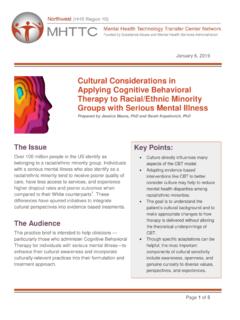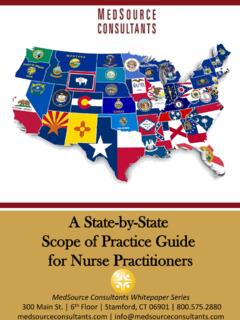Transcription of The CCBHC Model
1 THE CCBHC Model An Overview FLORIDA BEHAVIORAL HEALTH ASSOCIATION 1 OVERVIEW OF CERTIFIED COMMUNITY BEHAVIORAL HEALTH CLINICS Certified Community Behavioral Health Clinics (CCBHCs) are non-profit organizations that provide integrated health care for individuals and families with behavioral health conditions who are underserved, uninsured, insured, on Medicaid and/or Medicare, regardless of ability to pay. The CCBHC Model is not a program , but rather a system transformation built on the concept that the way to expand and improve behavioral health care is to pay for the activities that make those goals possible. CCBHCs must provide a minimum of nine types of services directly, or through contract with partner organizations, with an emphasis on the provision of 24-hour crisis care, evidence-based practices, care coordination with community partners, and integration with physical health care.
2 The Substance Abuse and Mental Health Services Administration (SAMHSA) has developed a minimum set of criteria and quality measures for organizations to meet in order to attain and maintain certification. For states that chose to implement the CCBHC Model , SAMHSA has also developed a CCBHC State Certification Guide. States may add criteria to meet the specific needs of their residents and communities. Once an organization is certified in a state that has implemented the CCBHC Model , it can become a new provider type under Medicaid and is eligible for prospective payments. Instead of traditional fee-for-service models, CCBHCs are paid a daily or monthly prospective payment rate that covers the actual cost of person/family-centered, quality care, including services traditionally not covered by Medicaid such as care coordination, outreach, intervention, and more.
3 The prospective payment system (PPS) authorized under the CCBHC Model , incentivizes the right care at the right time at the right dose as well as keeps individuals out of expensive inpatient crisis settings. These are value-based payment arrangements with quality incentive programs targeted to meet state s goals. CCBHC : A Transformative Model for Community Behavioral Health This CCBHC overview answers three questions: 1. Under what authorities are CCBHCs established? 2. How are CCBHCs funded and what are the costs? 3. What are the outcomes experienced by implementing states? Ensure access to integrated, evidence-based behavioral health careMeet stringent criteria regarding timeliness of access, quality reporting, staffing, and care coordination Receive funding to support the real cost of expanding and improving services to fully meet the need in communities.
4 FLORIDA BEHAVIORAL HEALTH ASSOCIATION 2 1 Authority and Background The Protecting Access to Medicare Act (PAMA) of 2014 (Public Law 113-93) established the CCBHCs and directed the Department of Health and Human Services (HHS) to implement CCBHCs demonstration programs in up to eight states to improve community behavioral health services. The demonstration programs were initially funded for a two-year period ending June 30, 2019, which has subsequently been extended through appropriations until September 30, 2023. Section 223 of PAMA directed HHS to: Establish criteria for states to certify community behavioral health clinics. Provide guidance on the development of a Prospective Payment System.
5 Award planning grants to states for the purpose of developing proposals to participate in the demonstration programs. Select up to eight states to participate in the demonstration program. Reimburse demonstration programs the federal Medicaid matching funds as specified in section 223(d)(5) of PAMA. Evaluate the project and prepare annual reports to Congress. Since the initial passage of PAMA, Congress has funded additional grants to expand the CCBHC Model nationally outside the demonstration grants. There are 430 CCBHCs in 40 states that are currently funded as a Section 223 demonstration program, through expansion grants funded through SAMHSA, or through independent state implementation.
6 The following provides a brief description of the planning grants, demonstration programs, and CCBHC expansion grants. Planning Grants On October 19, 2015, HHS awarded a total of $ million in planning grants to 24 states to support their efforts to certify community behavioral health clinics, solicit input from stakeholders, establish prospective payment systems for demonstration reimbursable services, and prepare an application to participate in the program. SAMHSA, in conjunction with the Centers for Medicare and Medicaid Services (CMS) and the Assistant Secretary of Planning and Evaluation (ASPE) developed and awarded the planning grants for planning purposes to develop proposals to participate in a two-year demonstration program.
7 Demonstration Programs On December 21, 2016, SAMHSA announced the following eight states were chosen, from among the planning grantees that submitted applications, to operate the Section 223 demonstration programs for CCBHCs. The two-year demonstration programs were implemented by June 30, 2017, and as noted earlier were extended through June 30, 2023. Medicaid is the funding source for the CCBHC demonstration programs. minnesota Missouri New York New Jersey Nevada Oklahoma Oregon Pennsylvania FLORIDA BEHAVIORAL HEALTH ASSOCIATION 3 CCBHC Expansion Grants In addition to extending the funding for the Section 223 demonstration programs, Congress has appropriated funds to HHS for CCBHC expansion grants each year since 2018 to expand the CCBHC Model nationally.
8 In December 2020, Congress allocated $600 million for CCBHC expansion grants as part of the COVID-19 relief bill and funding package. SAMHSA has the primary responsibility within HHS for administering the expansion grants. The expansion grants are designed to increase access to and improve the quality of community behavioral health services, with an emphasis on services for individuals with serious mental illness or substance use disorders, including opioid disorders; children and adolescents with serious emotional disturbance; and individuals with co-occurring disorders. Eligibility for these grants is limited to CCBHCs or community-based behavioral health clinics who may not yet be certified but meet the certification criteria and can be certified within 4 months of award.
9 The individual grant awards are up to $2 million over a period not to exceed two years with grant funds being used to supplement but do not supplant other coverage sources; grantees continue to bill Medicaid and other payers for covered services as normal. The expansion grants are providing organizations an opportunity to expand access to comprehensive and evidence-based mental health and addiction care by offering the required array of services. However, the grants do not include the CCBHC Medicaid prospective payment system authorized under the Section 223 demonstration programs and will not provide the financial foundation to sustain expansion grantees activities over the long term unless states actively seek to permanently implement the CCBHC Model .
10 Currently, there are 15 CCBHC expansion grants in Florida with the potential for additional grant awards by the end of this year. FLORIDA BEHAVIORAL HEALTH ASSOCIATION 4 2 Funding and Costs This section provides a description of funding sources available to CCBHCs and the cost associated with the CCBHC demonstration programs funded through Medicaid using a prospective payment system. Funding The source of funding for the majority of services provided through CCBHCs is Medicaid. Other funding sources are used to support individuals not eligible for Medicaid as well as services not covered by Medicaid. Funding sources available for non-Medicaid eligible individuals and services includes block grants and general revenue administered by the Department of Children and Families, indigent care funds, and third-party payers such as private insurers.





